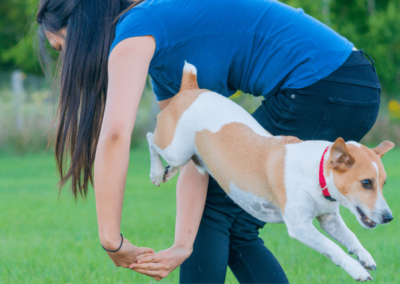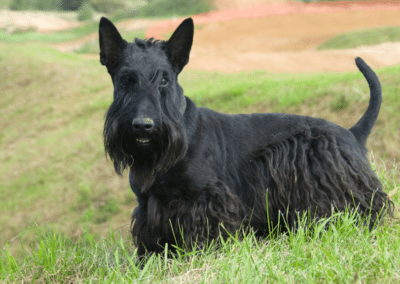While your dog’s in the midst of a deep sleep, have you ever observed them barking, twitching, or running in place? As you probably expected, dogs do indeed dream and these physical actions are all indicators of your canine in an active dreamlike state. Due to dogs requiring more sleep than humans, averaging around 12-14 hours a day, our furry friends may actually dream more often than we do. Unfortunately, canines can’t explain the contents of their dreams to us, which raises the question, what do dogs dream about? Below we detail the science behind canine dreams and what we predict plays through their heads while they sleep.
Doggy Dreams
In a 2001 study, MIT (Massachusetts Institute of Technology) researchers discovered that animals experiences dreams similarly to humans. By recording rats as they slept, the MIT study observed brain activity uniquely correlated with their memories. From these findings, it’s predicted that nearly all animals, dogs included, regularly dream in a similar way to what human’s experience. You can tell your dog is dreaming if their displaying the following signs:
- Their eyes are moving behind their eyelids.
- They’re wagging their tail.
- They’re making noises such as barking, yelping, whimpering, or even growling.
- They’re making movements, such as muscle twitches or imitating running.
Researchers have recently discovered some fascinating evidence to show that not all dogs dream equally. While puppies appear to dream more often than adult dogs, interestingly enough, senior dogs also appear to dream more when compared to when they were in their adult years. Additionally, larger dog breeds seem to have less frequent longer dreams, while smaller dog breeds have been observed having more frequent shorter dreams.
What Do Dogs Dream About?
Like humans, dogs experience multiple stages during their standard sleep cycle, and dreams occur while they’re deep in REM (Rapid Eye Movement) sleep. When we, humans, dream, we commonly replay about our real-life experiences within a bizarre dreamlike facade. We expect that dogs experience dreams in a similar way as they could be imagining themselves chasing squirrels, playing fetch, or barking at the mailman. While dogs may dream happy dreams, they also can experience nightmares such as traumatic memories, being abandoned, or getting into a fight with another dog. In these situations, it’s advised not to wake a dog experiencing a nightmare as they may mistakenly bite their owner. However, if your dog is experiencing a seizure rather than a dream, take your furry friend to a veterinarian immediately following their episode.
How Do I Help My Dog Have a More Restful Sleep?
When it comes to dogs, similarly to people, a dog’s mental health is closely tied to their physical health. Improving a dog’s memory, mental focus, motor skills, and overall brain function can actually improve the likelihood that your canine will have happy dreams rather than nightmares. Fortunately, Dr. Bill’s Cognitive Support provides superior protection for maintaining brain health and potentially even reversing the signs of cognitive dysfunction. Giving your pet a pill can be a challenge, that’s why most of our supplements are formulated as a powder that can be sprinkled dry onto any diet or moistened to make a tasty, nutritious broth. It’s easy and dogs love the flavor!
-
 Canine Cognitive Support$58.95
Canine Cognitive Support$58.95








0 Comments